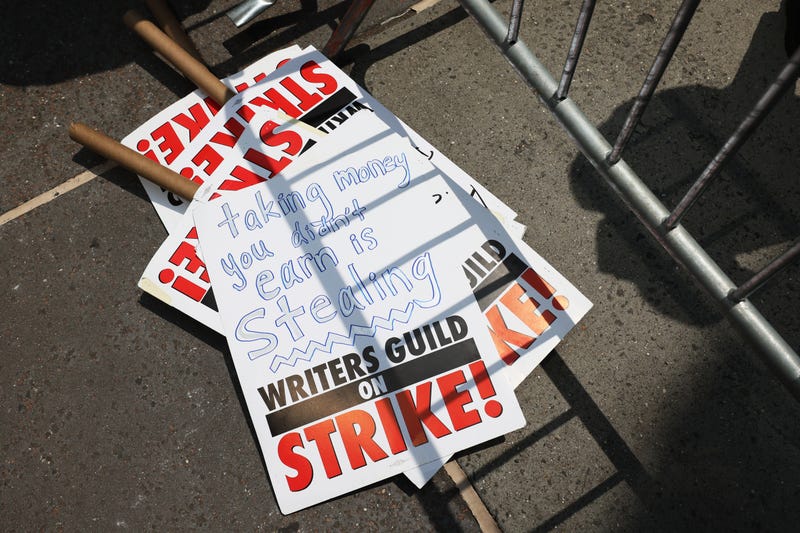
LOS ANGELES (CNS) - One day before the sides are scheduled to discuss a possible restart of contract talks, the Writers Guild of America and an alliance of Hollywood studios traded barbs Thursday, shining light on the tense nature of the labor standoff that has seen writers walking picket lines for the past three months.
The WGA negotiating committee sent an email to its members Thursday challenging studios to abandon an "anti-union playbook" and come prepared to offer a fair deal. The studios shot back, calling the union rhetoric "unfortunate," insisting its "only playbook is getting people back to work."
The WGA announced Tuesday that it had been contacted by the Alliance of Motion Picture and Television Producers -- which represents studios in the contract negotiations -- and a meeting is set for Friday to discuss a resumption of talks, which have not occurred since writers went on strike May 2.
In its Thursday message to union members, the WGA negotiating committee praised their resolve and blasted suggestions the walkout was having limited impact on studios due to content stockpiles held by streaming services, and that a protracted strike might be "good for the companies financially" because they can "write off their losses."
"This is calculated disinformation about the real impact of the ongoing strikes," according to the WGA statement. "We have shut down production. Union writers and actors are so essential in this industry that the companies cannot even attempt to do the work without us. It is not a viable business strategy for these companies to shut down their business for three months and counting no matter how much they try and pretend it is."
The negotiating committee warned the AMPTP not to repeat tactics of the 2007-08 writers strike, which the union contends was an effort to "spread dissent" through the media.
"We won't prejudge what's to come. But playbooks die hard," according to the WGA statement. "So far, the companies have wasted months on their same failed strategy. They have attempted, time and time again, through anonymous quotes in the media, to use scare tactics, rumors and lies to weaken our resolve.
"... Therefore, we challenge the studios and AMPTP to come to the meeting they called for this Friday with a new playbook: Be willing to make a fair deal and begin to repair the damage your strikes and your business practices have caused the workers in this industry."
The AMPTP issued a statement in response, saying Friday's discussion with the WGA "is to determine whether we have a willing bargaining partner. The WGA bargaining committee's rhetoric is unfortunate."
"This strike has hurt thousands of people in this industry, and we take that very seriously," according to the AMPTP. "Our only playbook is getting people back to work."
The rhetorical salvos cast a shadow over Friday's planned meeting, which some observers saw as a possible break in the labor stalemate that has effectively halted most studio production.
The WGA is pushing for improvements on a variety of fronts, notably for higher residual pay for streaming programs that have larger viewership, rather than the existing model that pays a standard rate regardless of a show's success.
The union is also calling for industry standards on the number of writers assigned to each show, increases in foreign streaming residuals and regulations preventing the use of artificial intelligence technology to write or rewrite any literary material.
The AMPTP has pushed back against some of the WGA's demands, particularly around its calls for mandatory staffing and employment guarantees on programs. AMPTP has also pushed back against WGA demands around streaming residuals, saying the guild's offer would increase rates by 200%.
The use of artificial intelligence has emerged as a major topic. The WGA says it wants a ban on the use of AI, and contends the AMPTP has refused to even negotiate the issue. The AMPTP said the issue raises "important creative and legal questions" and requires "a lot more discussion, which we've committed to doing."
SAG-AFTRA, the union representing 160,000 actors, went on strike July 14, joining striking Writers Guild of America members. The double-barreled strike is the first time in 63 years both unions have walked off the job simultaneously.
The SAG-AFTRA negotiating team issued a statement in July outlining the key issues in the dispute and insisting that the AMPTP "wouldn't meaningfully engage on the most critical issues."
The SAG-AFTRA list included the core demands of general wage increases, protections against the use of actor images through artificial intelligence, boosts in compensation for successful streaming programs and improvements in health and retirement benefits.
The AMPTP last month accused SAG-AFTRA of ignoring a contract offer the studios valued at more than $1 billion in wage increases, pension and health contributions, along with residual increases and protections regarding the use of artificial intelligence. SAG-AFTRA officials have disputed the nature of that offer.
Follow KNX News 97.1 FM
Twitter | Facebook | Instagram | TikTok


